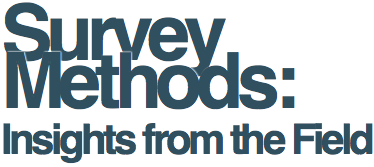Volume 2, issue 2 (2024)
Time and sample quality in a Facebook ad-generated survey with Polish migrants in the UK
Migrants are considered a hard-to-reach population – it is hard to recruit them due to lack of accessible sampling frames or recruit in a timely manner if frames are available or self-constructed. Recently, social media advertisement campaigns (ads) have become an increasingly popular method of recruiting hard-to-reach populations, including migrants, due to lower costs and [...]
Facebook, fieldwork length, non-probability samples, sample quality, Satisficing, Social media survey, time,
The Effect of Quick Response (QR) Codes on Response Rates and Respondent Composition: Results from a Statewide Experiment
We conducted a randomized experiment that evaluated how the inclusion of a Quick Response (QR) code in mailed survey recruitment materials for a sequential mixed-mode (push to web followed by self-administered mail back) survey fielded with a statewide probability address-based sample impacted survey participation. Each address was randomly assigned to receive mailed recruitment materials with [...]
experiment, hard to reach populations, QR codes, Representativeness, survey response rates,
Using surveys to assess students' political knowledge: Evidence of a gender gap or disparate response styles?
The aims of public education often include preparing students to be actively engaged in the civic and political realms of society. However, research findings have consistently provided evidence of a gender gap in political knowledge, with men demonstrating significantly higher levels of political knowledge than women. Recently, scholars have begun questioning the validity of such [...]
data quality, gender comparisons, item response theory, measurement, validity,
The Effect of Operationalization on the Correlation between Objective and Subjective Socioeconomic Status: A Systematic Review and Meta-Analysis
Socioeconomic status (SES) plays a fundamental role in social science research and beyond, serving as an important indicator for understanding societal structures and social inequalities. Measuring SES involves diverse approaches, including objective and subjective measures, raising questions about their relationship and the factors influencing its size. This study investigates the correlation between objective and subjective [...]
education, income, occupation, Socioeconomic status, subjective socioeconomic status,





